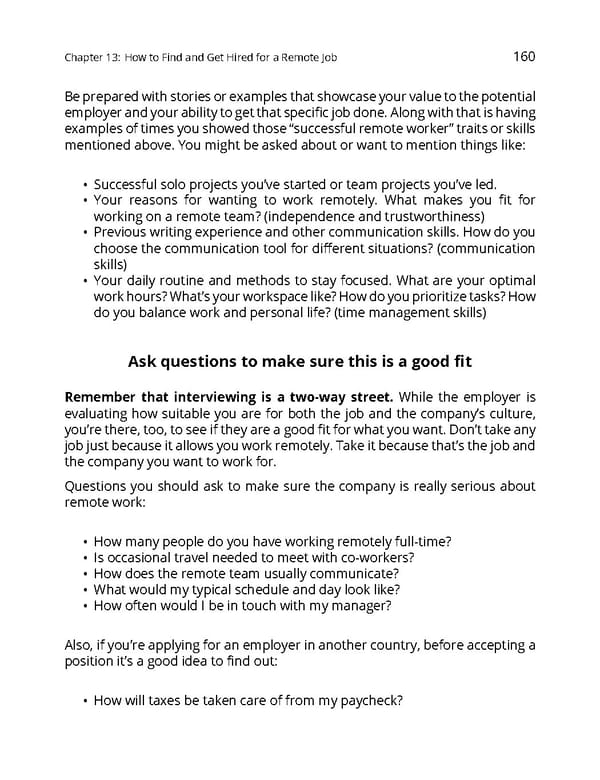Chapter13: HowtoFindandGetHiredforaRemoteJob 160 Bepreparedwithstoriesorexamplesthatshowcaseyourvaluetothepotential employerandyourabilitytogetthatspecificjobdone.Alongwiththatishaving examplesoftimesyoushowedthose“successfulremoteworker”traitsorskills mentionedabove.Youmightbeaskedaboutorwanttomentionthingslike: • Successful solo projects you’ve started or team projects you’ve led. • Your reasons for wanting to work remotely. What makes you fit for workingonaremoteteam?(independenceandtrustworthiness) • Previous writing experience and other communication skills. How do you choose the communication tool for different situations? (communication skills) • Your daily routine and methods to stay focused. What are your optimal workhours?What’syourworkspacelike?Howdoyouprioritizetasks?How doyoubalanceworkandpersonallife?(timemanagementskills) Askquestionstomakesurethisisagoodfit Remember that interviewing is a two-way street. While the employer is evaluating how suitable you are for both the job and the company’s culture, you’re there, too, to see if they are a good fit for what you want. Don’t take any jobjustbecauseitallowsyouworkremotely.Takeitbecausethat’sthejoband the companyyouwanttoworkfor. Questions you should ask to make sure the company is really serious about remotework: • Howmanypeopledoyouhaveworkingremotelyfull-time? • Is occasional travel needed to meet with co-workers? • Howdoestheremoteteamusuallycommunicate? • Whatwouldmytypicalscheduleanddaylooklike? • HowoftenwouldIbeintouchwithmymanager? Also, if you’re applying for an employer in another country, before accepting a position it’s a good idea to find out: • Howwilltaxesbetakencareoffrommypaycheck?
 The Ultimate Guide to Remote Work Page 163 Page 165
The Ultimate Guide to Remote Work Page 163 Page 165